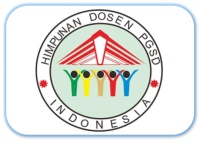Pengembangan Media Pembelajaran Berbasis Schoology untuk Meningkatkan Hasil Belajar Siswa Kelas V SD
Abstract
The use of technology in the industrial revolution era 4.0 is a challenge as well as an opportunity to improve the quality of learning. One of the uses of technology in learning is the creation of schoology media . This study aims to developing shoology–based solids learning media wich are valid, practical, and effective to improve the fifth year elementary school students’ learning outcomes.This study used a research and development method with Plomp model wich consisted of three stages: preliminary research, development and prototype phase and assessment. This study was conducted in SDN 08 Padang Besi, Padang. The data were collected using test and no-test techniques. The results of this study indicate that developed learning media is valid with a validity level of 88,02% and practicality students respons with a practicality level of 95% and teacher respon with a practicality level of 95,83%. Furthermore, it was found using schoology media has a significants impact on the students’ learning outcomes. The results of the t-test show that > , or 8,026 > 2,145. Moreover, the effectiveness of schoology media makes 80% of the students reach KKM.
Keywords
Full Text:
PDFReferences
Akbar, S., & Sriwijaya, H. (2011). pengembangan kurikulum dan pengembangan pembelajaran ilmu pengetahuan sosial (IPS). PT. Cipta Media.
Alien, K. E., & Marotz, L. R. (2010). Profil Perkembangan anak prakelahiran hingga usia 12 tahun. PT. Indeks.
Arsyad, A. (2011). Media Pembelajaran. Jakarta: Rajawali Pers.
Budiman, H. (2017). Peran Teknologi Informasi dan Komunikasi Dalam Pendidikan 8(I), 31–43.
Chen, T., & Cai, J. (2019). An Elementary Matemtics Teacher Learning To Teach Using Prblem Posing: A Case Of The Distributive Property Of Multiplication Over Addtion. International Journal Of Educational Reseach. https://doi.org/10.1016/j.ijer.2019.03.004
Darmayanti. (2016). Penggunaan Media Virtual Interaktif Untuk Meningkatkan Hasil Belajar Siswa Pada Konsep Tekanan Di Kelas X Smk Negeri 5 Telkom Banda Aceh. Skripsi. Fakultas Tarbiyah dan Keguruan pendidikan fisika UIN Arraniry Darussalam Banda Aceh
Dewi, D. A. (2019). Pembelajaran Matematika Melalui Blended Learning Berbasis Multi Aplikasi Sebagai Strategi Menghadapi Era Revolusi Industri 4.0. 14(2), 27–32.
Hakim, A. R. (2019). Menjawab Tantangan Era Industry 4.0 Dengan Menjadi Wirausahawan Di Bidang Pendidikan Matematika. Prosiding Seminar Nasional Pendidikan KALUNI, 2.
Hermawan, D., & Prabawanto, S. (2016). Pengaruh Penerapan Model Pembelajaran Problem Based Learning Berbantuan Media Teknologi Informasi Dan Komunikasi. Eduhumaniora Jurnal Pendidikan Kampus Cibiru, 7, 1.
Indrajit, richardus eko. (2019). Meneropong peran guru dan dosen serta karakteristik satuan pendidikan di masa depan. In Seminar Nasional Envisioning the next industrial revolution 5.0. Jakarta: PGRI Smart Learning Center. Intelitek. https://doi.org/Jakarta
Lestari, kurnia eka, & Yudhanegara, muhammad ridwan. (2017). penelitian pendidikan matematika.Bandung: Pt. Refika aditama.
Plomp, T., Akker, J. Van Den, Bannan, B., Kelly, A. E., & Nieveen, N. (2013). Educational Design Research (T. Plomp & N. Nieveen (eds.))enschede:Slo.
Rahim, F. R., Suherman, D. S., & Murtiani. (2019). Analisis Kompetensi Guru dalam Mempersiapkan Media Pembelajaran Berbasis Teknologi Informasi Era Revolusi Industri 4 . 0. 3(November).
Sulaiman, pungky achmad, & Wibawa, setya chendra. (2018). Penerapan Media Pembelajaran Berbasis Schoology Mobile Untuk Meningkatkan Hasil Belajar Pada Mata Pelajaran Jaringan Dasar Kelas X TKJ DI SMK Pahlawan Mojosari. It-Edu, 3(01), 75–84.
Supardi. (2017). statistik penelitian pendidikan. Jakarta: Rajawali Pers.
Titiana, E. S., Yolandini, B., Wiriyanti, K., & Azizah, N. (2019). Guru transformers: pembaharu media pembelajaran di sekolah dasar era revolusi industri 4.0. 2(1), 309–314.
Trisna, B. N. (2019). Pendidikan 4.0: Perubahan Paradigma Dan Penguatan Kearifan Lokal Dalam Pembelajaran Matematika. 5(1), 83–92.
Whitacre, I., Atabas, S., & Findley, K. (2018). Exploring Unfamiliar Paths Through Matematical Territory: Constrains And Affordances In A Preservice Teacherd Reasoning About Fraction Comparions. He Journak of Mathematical Behavior. https://doi.org/10.1016/j.jmathb2018.06.006
Wulansari, nyi mas diane. (2017). Didiklah anak sesuai zamannya:mengoptimalkan potensi anak di era digital. Pt. visimedia pustaka.
Zainil, M., Masniladevi, Helsa, Y., & Ariani, Y. (2019). Qr Code Untuk Pembelajaran Bangun Ruang Matematika Sd. Jurnal Mutiara Pendidikan, X(X).
DOI: http://dx.doi.org/10.24036/e-jipsd.v9i2.9763


